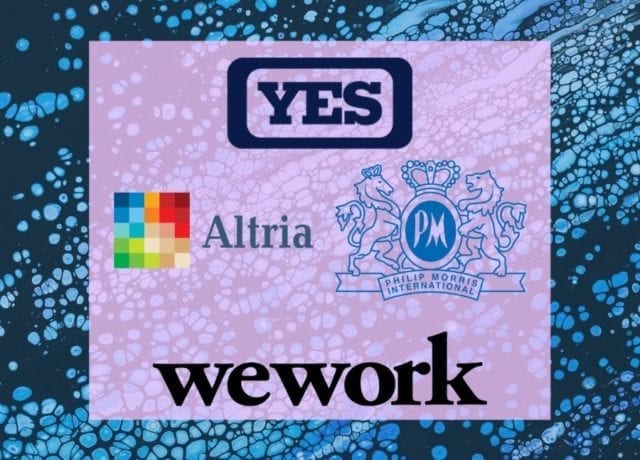In keeping with our mission to provide comprehensive advertising analysis, MediaRadar puts together a report of the most important mergers and acquisitions news each week. Stay in the loop, whether you sell advertising space or focus on business development.
This week, Disney divests from the YES Network in accordance with its previous acquisition of 21st Century Fox, two major tobacco companies may reunite to promote growth, and The We Company bolsters its portfolio ahead of its IPO with the acquisition of a competing coworking company.
Disney Sells Its Stake in YES Network
An investment group that includes TV station conglomerate Sinclair Broadcast Group, Amazon, and the New York Yankees has acquired Disney’s previous 80% stake in the Yankees Entertainment and Sports Network (YES Network).
The deal values the stake at $3.47 billion.
The YES Network is the highest-profile of the 22 regional sports channels that Disney agreed to sell to get regulatory approval for its $71.3 billion acquisition of 21st Century Fox. Per the terms of the deal, the Yankees sports team will own 26% of the network, Sinclair will own 20%, Amazon will own 15%, and the remaining 39% will be divided between various investment firms.
Tobacco Giants Propose Merger for Growth
Two tobacco giants may soon reunite.
Philip Morris International and Altria Group are currently discussing a potential all-stock merger of equals. Altria, known best for their Marlboro brand, split with Philip Morris in 2008 and focused primarily on domestic sales while Philip Morris shifted attention to selling cigarettes overseas.
The talk of reuniting has been taking place amidst plummeting cigarette sales, which have forced the two companies to search for new ways to grow.
The renewed partnership would create a much more diversified portfolio with investments in e-cigarettes and cannabis. Last December, Altria made a $38 billion deal for 35% stake in the e-cigarette company Juul. Juul controls about 75% of the e-cigarette market in the US, and joining with PMI could help them grow overseas. Altria also stepped into the growing cannabis market around the same time with a $1.8 billion bid for 45% stake in Cronos.
WeWork Parent Company Acquires Fellow Coworking Company
WeWork’s parent company, The We Company, announced that it will acquire rival co-working business Spacious.
Financial terms of the deal were not disclosed, but Spacious was valued at $29 million in May 2018. Spacious differentiates itself slightly from other companies in its niche: is a three-year-old on demand co-working space startup based in New York that allows customers to rent work space in restaurants during their off hours.
Before the current deal, WeWork had previously acquired 17 other companies. The growing company announced the acquisition of SpaceIQ just last month. WeWork is currently on track to become a public company, so it is no surprise that it is bolstering its businesses to justify its massive market valuation of $47 billion.
In Other News
These are some other notable deals and developments from the past week:
- Le Tote, a San Francisco-based clothing rental company, announced that it is acquiring the iconic but troubled luxury retailer Lord & Taylor from Hudson’s Bay Company for $100 million.
- The Hershey Co. has reached an agreement to acquire One Brands, LLC for $397 million. This latest acquisition by Hershey continues a trend of expanding from candy into more health-oriented markets.
- Telecoms and networking hardware manufacturer Cisco Systems announced that it has reached an agreement to acquire customer experience management firm CloudCherry. Upon completion of the deal, Cloudcherry will join Cisco’s Contact Center Solutions business.
- VMware, Inc. announced that it is acquiring cybersecurity company Carbon Black and cloud computing company Pivotal Software, Inc. for $2.1 billion and $2.7 billion, respectively.
- High-end shoe maker, Cole Haan is preparing for an IPO after reporting annual sales growth of 14% to $687 million.
- Forever 21 is considering filing for bankruptcy after struggling to restructure its debt. The apparel retailer has taken a hit from decreased foot traffic in malls, which house many of their locations. If bankruptcy proceedings are enacted, Forever 21 may be able to shed some of those locations in an effort to focus more on online sales.





